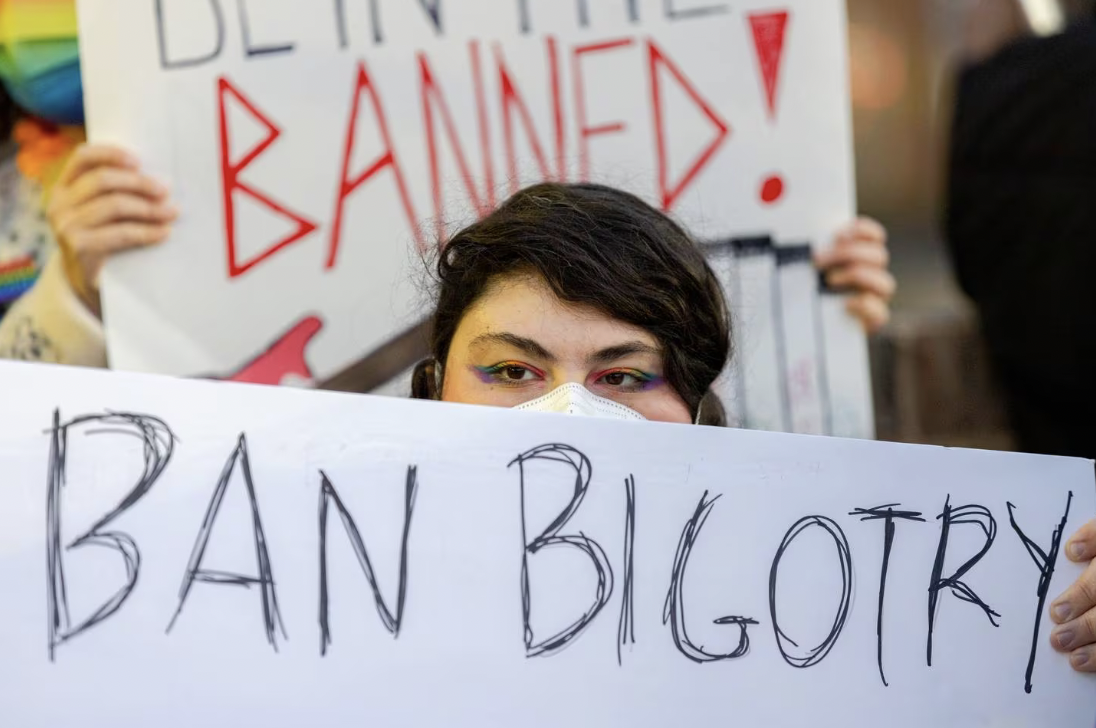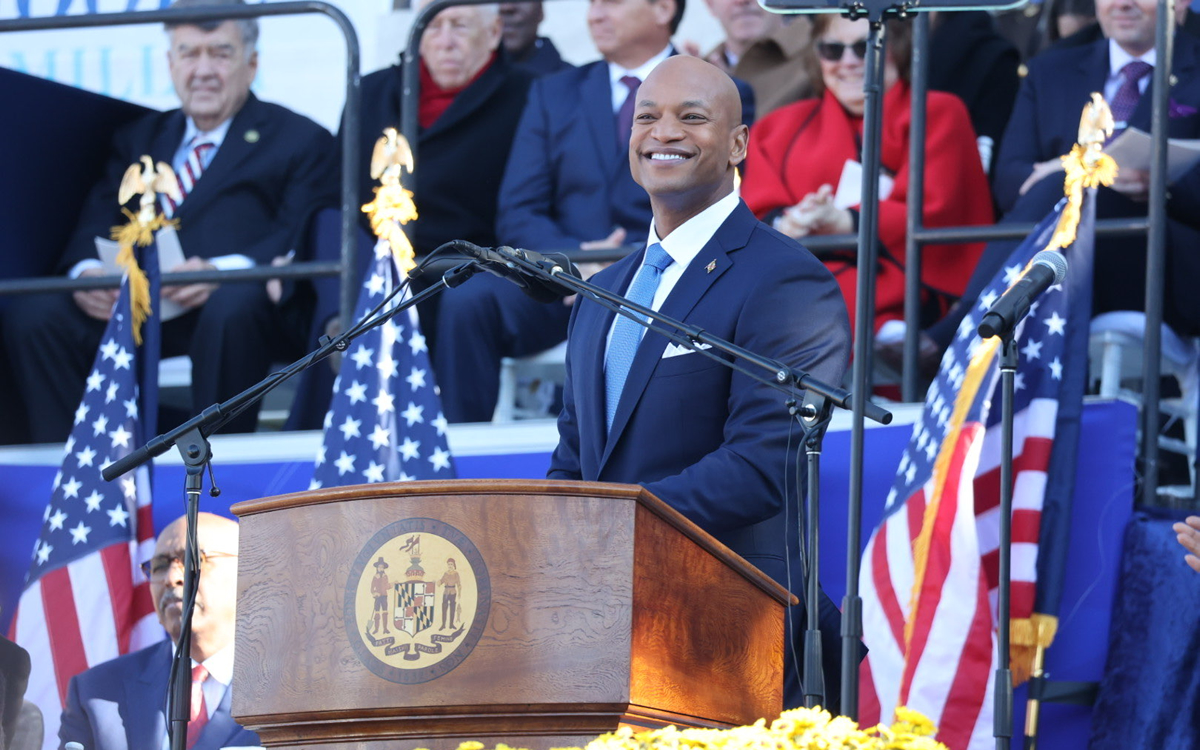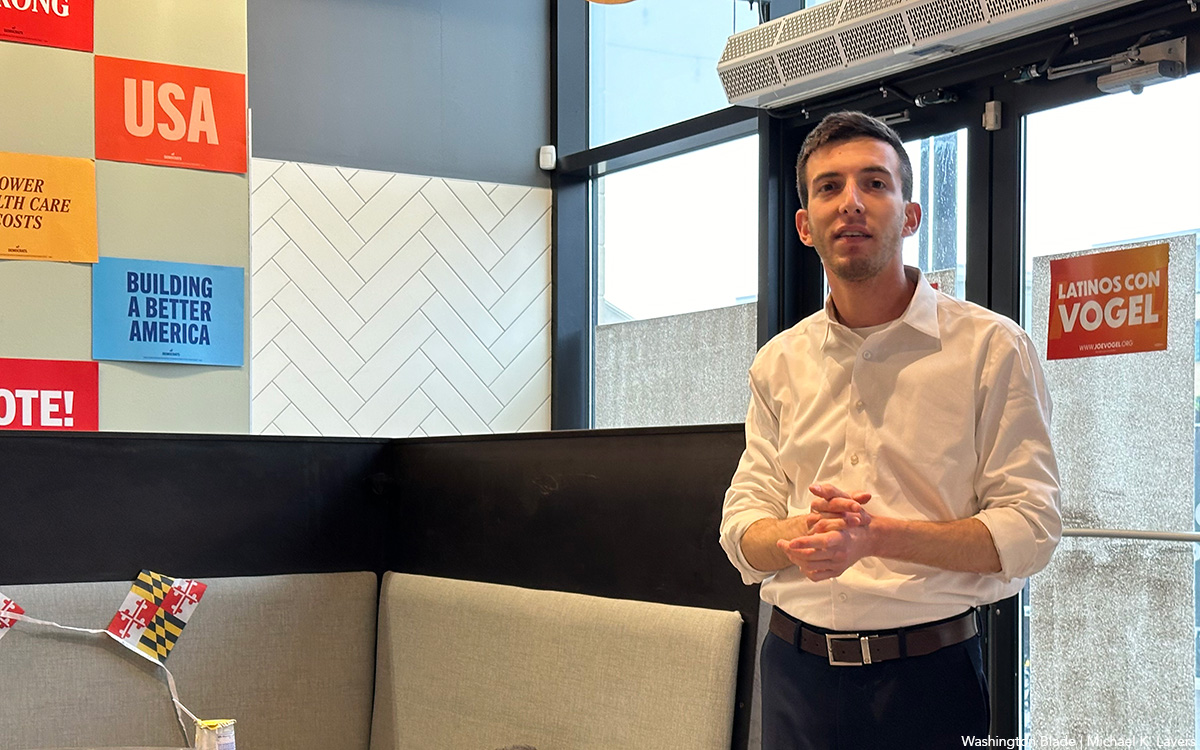Maryland
Moms for Liberty: A tale of two counties
In book ban fight, Maryland’s progressive Howard a stark contrast to neighboring Carroll

COLUMBIA, Md. — “I know there are children here,” said Jessica Garland, a little tremble to her voice. “This is my warning. There’s stuff that’s going to be said from these books. So if you want to remove your child, please do so now.” And with a deep breath, she continued. “He pushes against me, shoving the tip inside with a pop.” She paused for effect. The audience let out a few giggles and gasps of faux horror. Not a single parent removed their child from the room.
Garland was here in Howard County visiting from Carroll County, where as the chapter vice chair of Moms for Liberty, she had succeeded in pushing for the school board to ban “sexually explicit content” from school libraries. But her presentation here was attended by more mocker moms than soccer moms, fully clad in rainbow capes and Hawaiian necklaces, who had come to protest the event.
It is unlikely that the Howard chapter of Moms for Liberty will succeed in getting any books removed from schools, where none of the school board has signed the Moms for Liberty pledge to “secure parental rights at all levels of government.” The political makeup of Carroll and Howard counties is nothing alike: 60% of voters in Carroll voted for Trump in 2020, where only 26% in Howard did. Carroll County is an odd island of red in a sea of blue among the metropolitan counties of Maryland, with proximity to either Baltimore or D.C. It has a long history of right-wing proclivities, as a hotbed of KKK activity in the 20th century, and with only 59 of its 4,500 residents voting for Abraham Lincoln back in 1860.
Howard County, in contrast, seems like a queer paradise. The school system boasts a huge selection of LGBTQ programming, none of which can be found in Carroll schools: a biannual rainbow conference, LGBTQ book clubs for all age levels, Q&As for parents with queer kids, a queer literary magazine, and a Pride prom. But just because Moms for Liberty won’t succeed in replacing the school board doesn’t mean that they haven’t had any impact in Howard County.
At the Jan. 6 meeting of the school board, parents complained that their kids felt unsafe because of the recent political activity. And the school system has been pestered with numerous requests through the MPIA (Maryland Public Information Act) to report on the extent and funding of its LGBTQ programming. While the Howard County School System does employ a LGBTQIA+ Initiatives Specialist, Danielle DuPuis, they have not funded the many initiatives DuPuis has orchestrated since her hiring in 2022. DuPuis pays for the programming with fundraising through T-shirt sales, and with grants from organizations like Community Allies of Rainbow Youth. This lack of funding is a consequence of the school system’s tight budget, not of Moms for Liberty — but it is hard to imagine the school system diverting any of its limited funding to its LGBTQ programming with Moms for Liberty breathing down their neck.
This programming is important precisely because Howard County schools are not a queer paradise. On March 9, I attended one of Howard’s newer offerings: a Q&A for parents of queer students. The stories they told were shocking. Two parents described a Rainbow Fun Run that was held at Clarksville Middle School to raise money for queer youth. Students were encouraged to wear rainbow colored clothes for the event — but a dozen of the middle schoolers showed up in black from head to toe, wearing pins that said “There Are Only Two Genders.” It was refreshing to see the group react with humor. “Black is one of the colors of the rainbow,” one said. “You’re still participating anyway!”
Jessica insisted at the Moms for Liberty meeting that they were not trying to target LGBTQ books. “We did not target homosexuals, transsexuals [sic],” she said. It was clear the protesters in the audience did not believe her from the signs they carried: “Protect Trans Youth,” “Hate and Ignorance are Not Family Values,” “Ban Bigots Not Books.” They have good reason to distrust the intentions of Moms for Liberty. The Capital News Service conducted an analysis of the books Moms for Liberty targeted for removal in Carroll County, and concluded that a disproportionate number of those books were written by queer authors on queer subject matters.
But even if the quest to ban sexually explicit material from school libraries is in bad faith, the Moms for Liberty are right about one thing: The books they are targeting are sexually explicit. No protester at the event argued that the books weren’t sexually explicit, and yet no one defended the presence of sexually explicit books in schools, either. Perhaps this is not so surprising. Who wants to be seen arguing that schools should carry pornographic books? It’s far easier to defend LGBTQ books, and giggle at the spectacle of dirty words on a PowerPoint.
Unfortunately, the research on adolescents and pornography has a long way to go. In a highly cited meta-analysis of more than 100 articles on the subject published between 1995 and 2015, Jochen Peter and Patti M. Valkenburg were able to conclude very little. The literature points to an association between adolescent pornography use and both casual sex and sexual violence (both as victim and perpetrator). But the articles suffer from numerous biases. For one, they do not discriminate the content of the pornography: videos depicting consensual and non-consensual sex are lumped in together. There is a huge heteronormativity bias: queer forms of pornography have not been extensively studied. There is a negativity bias: the articles are actively looking for negative effects, not positive ones. (And all of this research has been done on internet pornography, not sexually explicit books in school libraries.)
At the end of the Moms for Liberty meeting, Nina Yukich, a fifth grade student, stayed behind to speak with Jessica. And though the library staff had already stacked up chairs for the night, I stole a seat to watch the exchange. Nina’s guardian, Dinah Yukich, had had a hostile encounter with Jessica during the Q&A portion of the event. Jessica called on Dinah as the “gentleman back there,” and Dinah accused her of “willfully and intentionally” misgendering her.
Jessica leaned down as she spoke with Nina, who stood clutching her copy of “Gender Queer,” one of the most common targets for book bans in schools. “Who do you want to talk to about this stuff?” Jessica asked. “Do you feel comfortable talking to teachers? And if this is your trusted adult — if you don’t have a trusted adult, or a friend, or a mom, or can write a letter to somebody — if you don’t have anybody to talk to […] you shouldn’t be alone reading that book.” I couldn’t believe my ears. Here was Jessica, not so subtly impugning Dinah as an untrustworthy adult. I was fully prepared for another hostile exchange.
But Dinah just stood by, observing. At no point did she interrupt Jessica, or start arguing on Nina’s behalf. It occurred to me that Dinah was letting Nina have an independent experience of the event. Dinah and Nina could obviously confer afterwards — it wasn’t as though Dinah was abdicating her role as guardian. But in letting Nina experience the night on her own, Dinah was giving the two of them something to genuinely confer about.
Dinah’s approach seems to me a model of the kind of parenting at stake in this debate over books. Do we let kids engage with sexually explicit material on their own, trusting them to confer with adults afterwards? Or do we need to be there all the while, ripping out any pages we don’t want them to see?
CJ Higgins is a postdoctoral fellow with the Alexander Grass Humanities Institute at Johns Hopkins University.

Maryland Gov. Wes Moore on Thursday signed a bill that seeks to combat efforts to ban books from state libraries.
House Bill 785, also known as the Freedom to Read Act, would establish a state policy “that local school systems operate their school library media programs consistent with certain standards; requiring each local school system to develop a policy and procedures to review objections to materials in a school library media program; prohibiting a county board of education from dismissing, demoting, suspending, disciplining, reassigning, transferring, or otherwise retaliating against certain school library media program personnel for performing their job duties consistent with certain standards.”
Moore on Thursday also signed House Bill 1386, which GLSEN notes will “develop guidelines for an anti-bias training program for school employees.”
Maryland
Health care for Marylanders with HIV is facing huge cuts this summer
Providers poised to lose three-quarters of funding

BY MEREDITH COHN | By the end of June, health care providers in Maryland will lose nearly three-quarters of the funding they use to find and treat thousands of people with HIV.
Advocates and providers say they had been warned there would be less money by the Maryland Department of Health, but were stunned at the size of the drop — from about $17.9 million this fiscal year to $5.3 million the next. The deep cuts are less than three months away.
The rest of this article can be read on the Baltimore Banner’s website.

GAITHERSBURG, Md. — Maryland state Del. Joe Vogel (D-Montgomery County) on Friday held a “Big Gay Canvass Kickoff” event at his congressional campaign’s headquarters.
LGBTQ+ Victory Fund Vice President of Outreach and Engagement Marty Rouse and John Klenert, a member of the DC Vote and Victory Fund Campaign board of directors, are among those who participated alongside members of Equality PAC. Vogel spoke before Rouse, Klenert and others canvassed for votes in the area.
“Joe brings a fresh new perspective to politics,” said Gabri Kurtzer-Ellenbogen, deputy field director for Vogel’s campaign.
Vogel, 27, is among the Democrats running for Congressman David Trone’s seat.
Trone last May announced his bid to succeed retiring U.S. Sen. Ben Cardin (D-Md.) in the U.S. Senate.
The Democratic primary is on May 14. Vogel would be the first Latino, the first gay man and first Gen Zer elected to Congress from Maryland if he were to win in November.
“We need a new generation of leadership with new perspectives, new ideas, and the courage to actually deliver for our communities if we want things to get better in this country,” Vogel told the Washington Blade last month during an interview in D.C.
-

 District of Columbia3 days ago
District of Columbia3 days agoCatching up with the asexuals and aromantics of D.C.
-

 South America3 days ago
South America3 days agoArgentina government dismisses transgender public sector employees
-

 Maine4 days ago
Maine4 days agoMaine governor signs transgender, abortion sanctuary bill into law
-

 District of Columbia4 days ago
District of Columbia4 days agoBowser budget proposal calls for $5.25 million for 2025 World Pride











